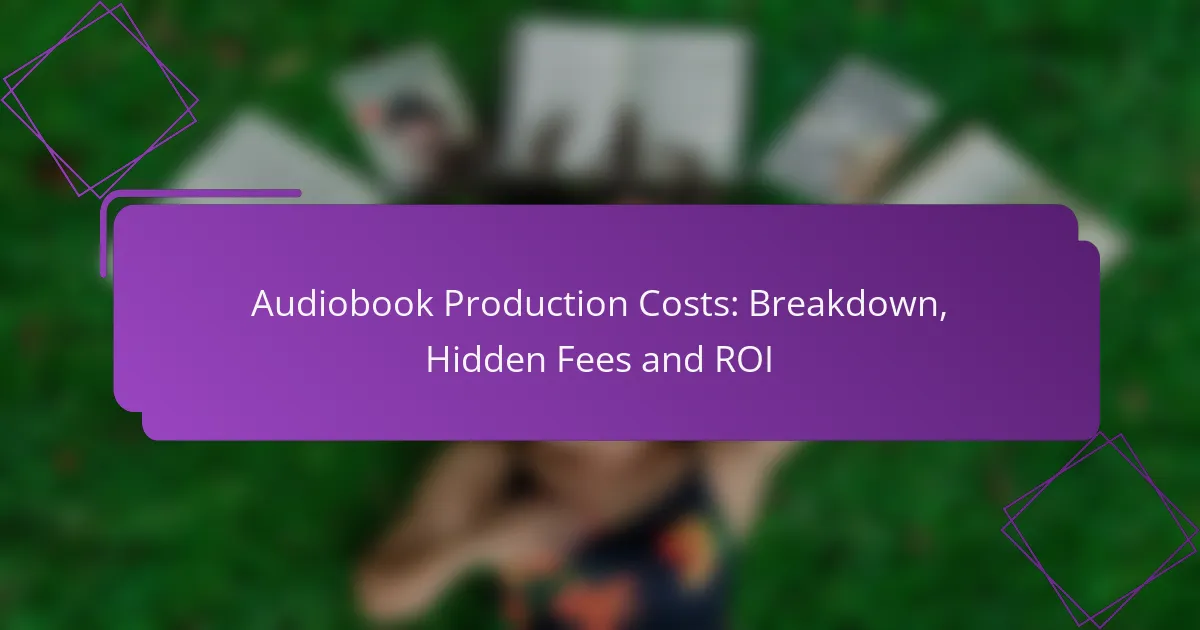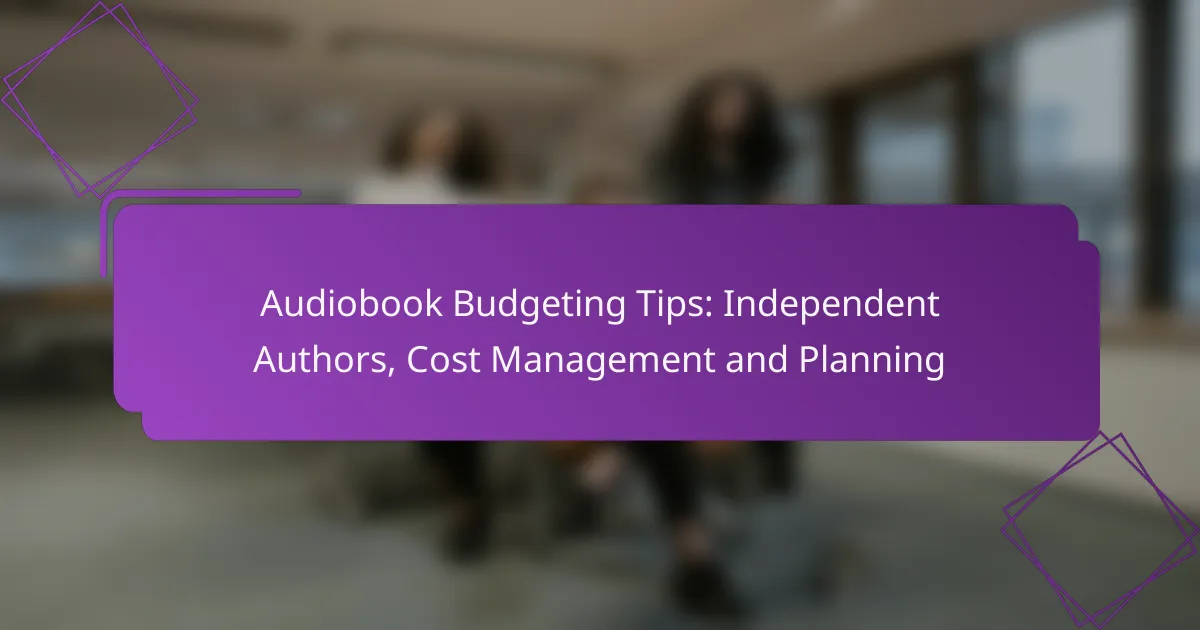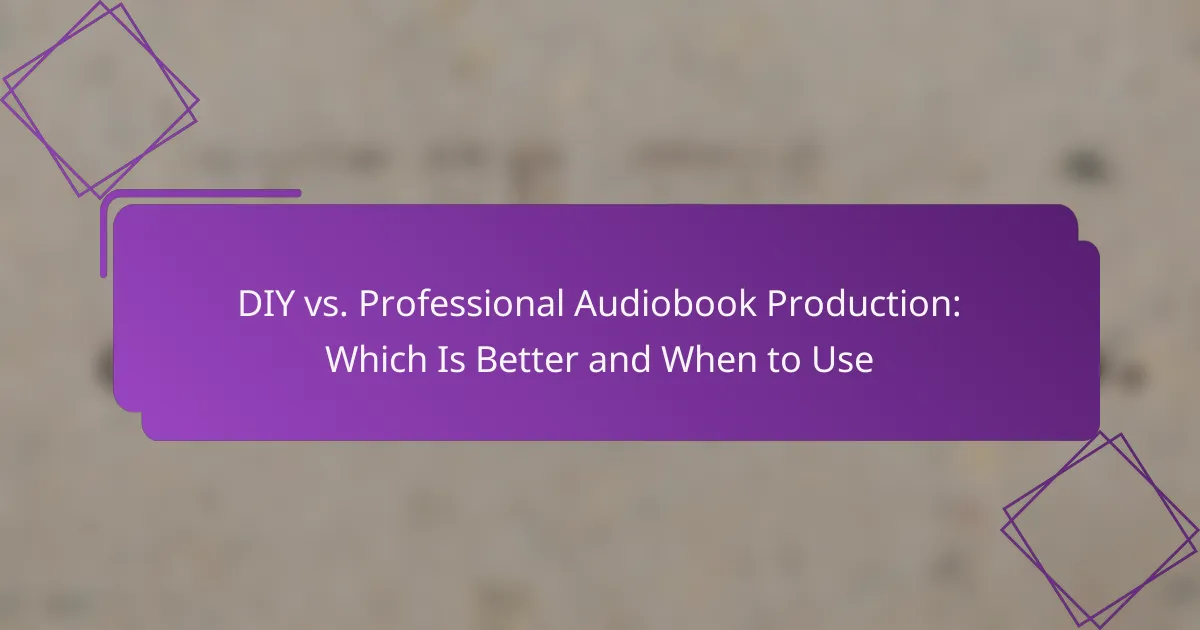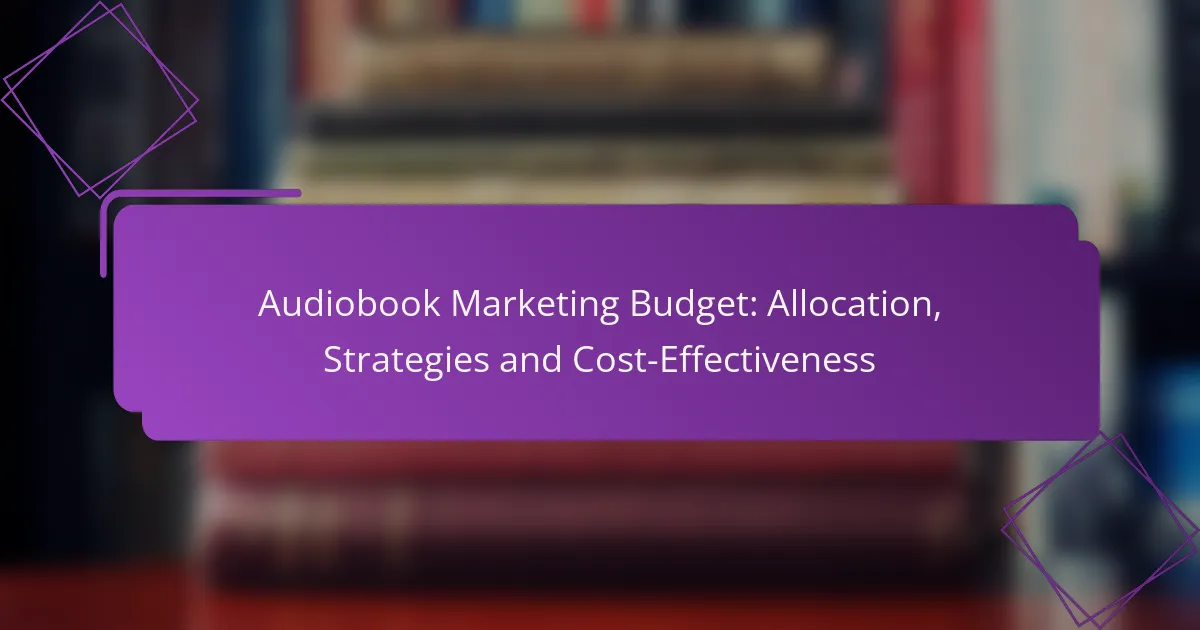Producing an audiobook can range from a few hundred to several thousand dollars, influenced by factors like narration quality and studio selection. It’s essential for authors and publishers to understand not only the visible costs but also the hidden fees that can arise, such as royalty and distribution charges. By carefully evaluating these expenses and the revenue generated, one can determine the return on investment (ROI) for their audiobook project.
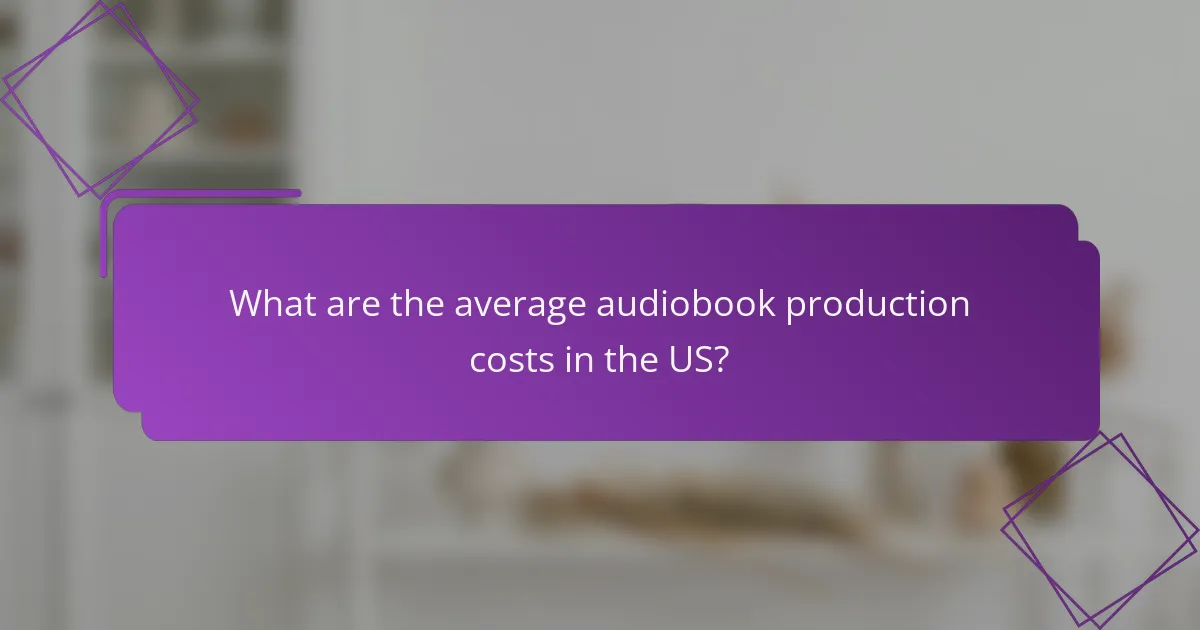
What are the average audiobook production costs in the US?
The average audiobook production costs in the US typically range from a few hundred to several thousand dollars, depending on various factors such as narration quality, studio choice, and post-production needs. Understanding these costs is crucial for authors and publishers aiming to budget effectively for audiobook projects.
Cost range for professional narration
Professional narration costs can vary significantly, generally falling between $200 to $1,500 per finished hour of audio. Factors influencing this range include the narrator’s experience, popularity, and the complexity of the material. Hiring a well-known voice actor may lead to higher fees but can enhance the audiobook’s marketability.
Studio recording expenses
Studio recording expenses usually range from $50 to $300 per hour, depending on the studio’s location and equipment quality. Some studios offer package deals that include recording and editing, which can be more economical. It’s essential to choose a studio that meets your project’s technical requirements while staying within budget.
Editing and post-production fees
Editing and post-production fees can add another $100 to $500 per finished hour of audio. This phase includes sound editing, mastering, and quality checks to ensure a polished final product. Investing in professional editing is crucial, as it can significantly impact the listener’s experience and overall satisfaction with the audiobook.
Distribution costs
Distribution costs for audiobooks can vary based on the platform used. Many distributors charge a percentage of sales, typically ranging from 20% to 40%, while others may have upfront fees. It’s important to evaluate different distribution options, such as Audible or independent platforms, to find the best fit for your audiobook’s target audience and sales strategy.
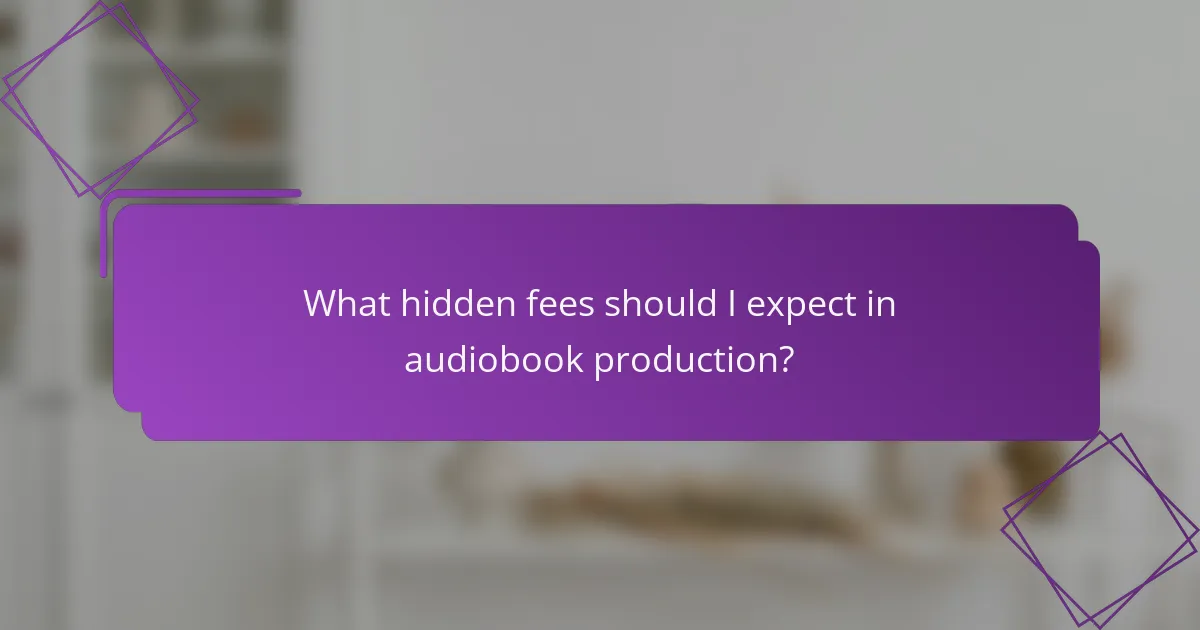
What hidden fees should I expect in audiobook production?
In audiobook production, hidden fees can significantly impact your overall budget. These costs often include royalty fees, marketing expenses, and platform distribution charges, which can add up quickly if not anticipated.
Royalty fees for authors
Royalty fees are payments made to authors or rights holders based on sales of the audiobook. Typically, these fees range from 10% to 25% of the retail price, depending on the agreement. It’s crucial to clarify these terms upfront to avoid unexpected deductions from your earnings.
Consider negotiating royalty rates before signing contracts, as some platforms offer more favorable terms than others. Understanding how royalties are calculated can help you project potential earnings accurately.
Marketing and promotion expenses
Marketing and promotion are essential for the success of your audiobook but can incur additional costs. Expenses may include social media advertising, promotional materials, and hiring publicists, which can range from a few hundred to several thousand dollars.
To manage these costs, allocate a specific budget for marketing early in the production process. Focus on cost-effective strategies, such as leveraging social media platforms and engaging with audiobook communities to maximize your reach without overspending.
Platform fees for distribution
Distribution platforms often charge fees for hosting and selling your audiobook. These fees can be a percentage of sales, typically between 20% to 30%, or a flat fee per title. Understanding these charges is essential for calculating your net revenue.
When selecting a distribution platform, compare their fee structures and services. Some platforms may offer better visibility or additional marketing support, which can justify higher fees. Always read the fine print to avoid surprises later on.
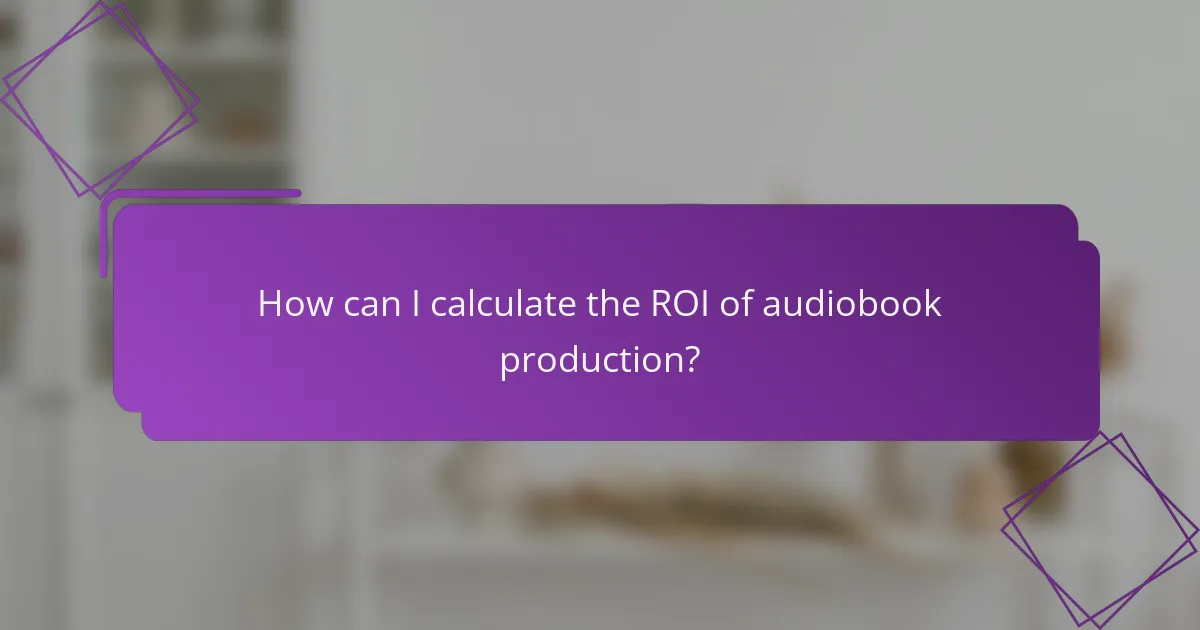
How can I calculate the ROI of audiobook production?
To calculate the ROI of audiobook production, assess the total revenue generated from sales and royalties against the total costs incurred during production. A positive ROI indicates that the investment in audiobook production is worthwhile, while a negative ROI suggests the opposite.
Revenue potential from sales
The revenue potential from audiobook sales can vary significantly based on factors such as genre, audience size, and marketing efforts. Typically, audiobooks priced between $10 and $25 can yield substantial returns, especially if they are well-promoted. Consider platforms like Audible or Google Play, which can help reach a broader audience.
Additionally, promotional strategies such as discounts or bundling with other products can enhance sales potential. Tracking sales data over time will provide insights into what pricing strategies work best for your specific audience.
Cost-benefit analysis
Conducting a cost-benefit analysis involves comparing the total costs of production—including recording, editing, and distribution—against the expected revenue. Production costs can range from a few hundred to several thousand dollars, depending on the quality and length of the audiobook.
It’s crucial to factor in hidden fees, such as platform commissions and marketing expenses. A thorough analysis will help identify whether the projected sales justify the investment, allowing for informed decision-making.
Long-term earnings from royalties
Long-term earnings from royalties can significantly impact the overall ROI of audiobook production. Many platforms offer royalty rates between 25% and 40% of sales, which can accumulate over time as the audiobook continues to sell. This passive income stream can enhance profitability beyond initial sales.
Consider the longevity of your audiobook’s appeal and the potential for ongoing marketing efforts to sustain sales. Regularly reviewing sales performance and adjusting marketing strategies can help maximize royalty earnings over the long term.
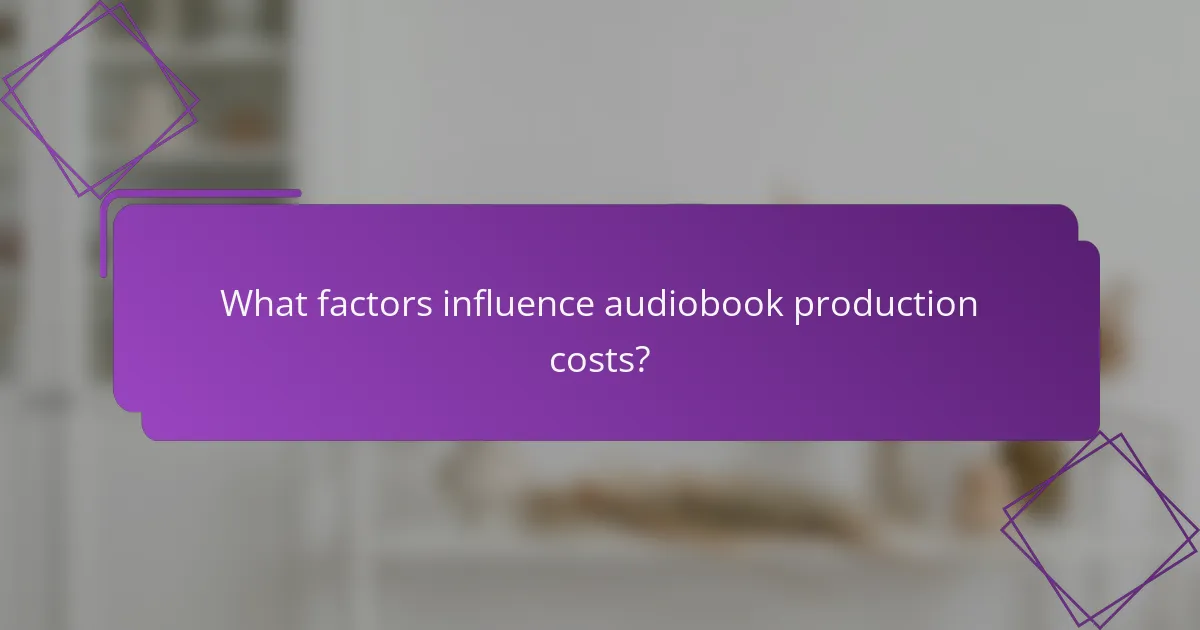
What factors influence audiobook production costs?
Audiobook production costs are influenced by several key factors, including the length of the audiobook, the experience of the narrator, and the quality of production equipment. Understanding these elements can help you budget effectively and make informed decisions about your audiobook project.
Length of the audiobook
The length of the audiobook is a primary cost driver. Typically, production costs increase with longer recordings due to additional time spent in narration, editing, and mastering. For instance, a standard rate might range from $100 to $400 per finished hour, depending on other factors.
When planning your audiobook, consider that a typical novel may run between 6 to 12 hours, while shorter works like novellas or essays could be 2 to 4 hours. This variance directly impacts your overall budget, so it’s wise to estimate the final length early in the process.
Experience of the narrator
The narrator’s experience can significantly affect production costs. Established narrators with a strong portfolio may charge higher fees, often ranging from $200 to $1,000 per finished hour, reflecting their expertise and reputation. In contrast, less experienced narrators may offer lower rates, but this could impact the overall quality of the audiobook.
When selecting a narrator, consider their previous work and audience reception. A skilled narrator can enhance the listening experience, potentially leading to better sales and reviews, which may justify a higher upfront investment.
Quality of production equipment
The quality of production equipment plays a crucial role in the final sound of the audiobook. Professional studios typically use high-end microphones, soundproofing, and editing software, which can increase production costs. Budgeting for quality equipment or studio time can range from a few hundred to several thousand dollars, depending on your needs.
Investing in better equipment or professional services can lead to a polished final product, which is essential for attracting listeners. If you opt for a DIY approach, ensure you have at least a decent microphone and soundproofing to avoid common pitfalls like background noise or poor audio clarity.
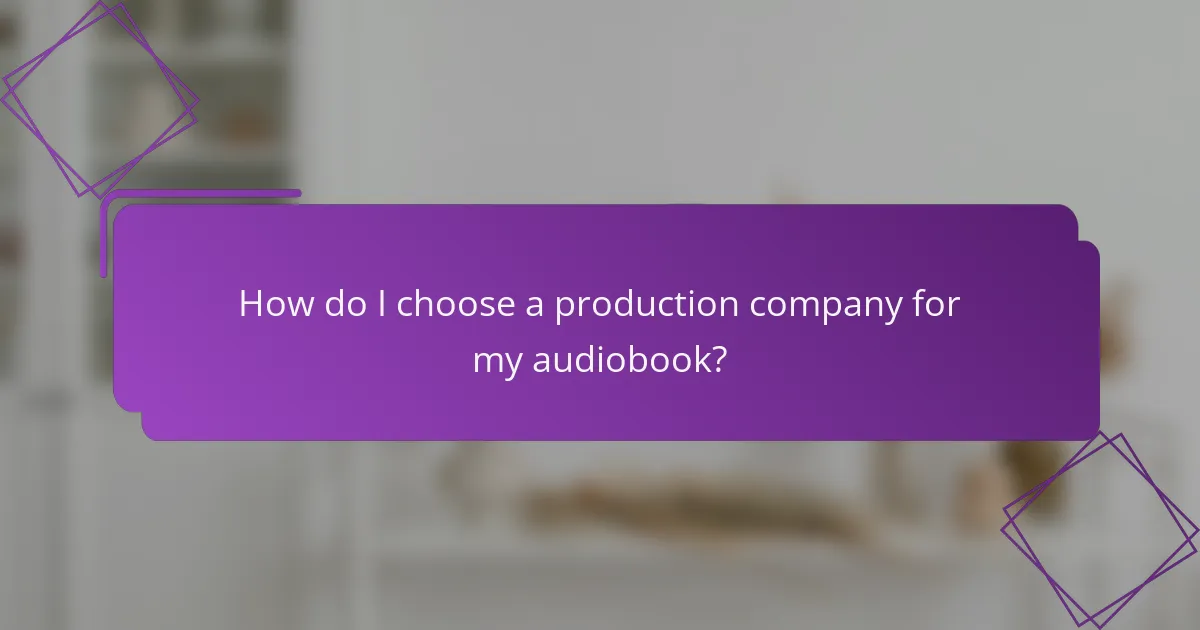
How do I choose a production company for my audiobook?
Choosing a production company for your audiobook involves evaluating their reputation, reviewing their sample work, and understanding their pricing structure. These factors will help ensure you select a company that aligns with your quality expectations and budget.
Reputation and reviews
Start by researching the reputation of potential audiobook production companies. Look for online reviews and testimonials from previous clients to gauge their reliability and quality of work. Websites like Goodreads or Audible can provide insights into how well a company’s audiobooks are received by listeners.
Additionally, consider asking for recommendations from authors or industry professionals who have experience with audiobook production. A company with a solid track record and positive feedback is more likely to deliver a satisfactory product.
Sample work and portfolio
Reviewing a production company’s sample work is crucial to understanding their style and quality. Most reputable companies will have a portfolio showcasing their previous audiobooks, which can give you a sense of their narration style, sound quality, and overall production values.
Pay attention to the genres they specialize in, as some companies may excel in specific areas like fiction, non-fiction, or educational content. Listening to samples will help you determine if their approach aligns with your vision for your audiobook.
Pricing structure and transparency
Understanding the pricing structure of a production company is essential to avoid unexpected costs. Many companies offer packages that include various services, such as narration, editing, and mastering. Be sure to ask for a detailed breakdown of what is included in each package.
Look for companies that are transparent about their fees and any potential hidden costs, such as additional charges for revisions or extra services. Comparing quotes from multiple companies can help you find a balance between quality and affordability, typically ranging from a few hundred to several thousand dollars depending on the complexity of your project.
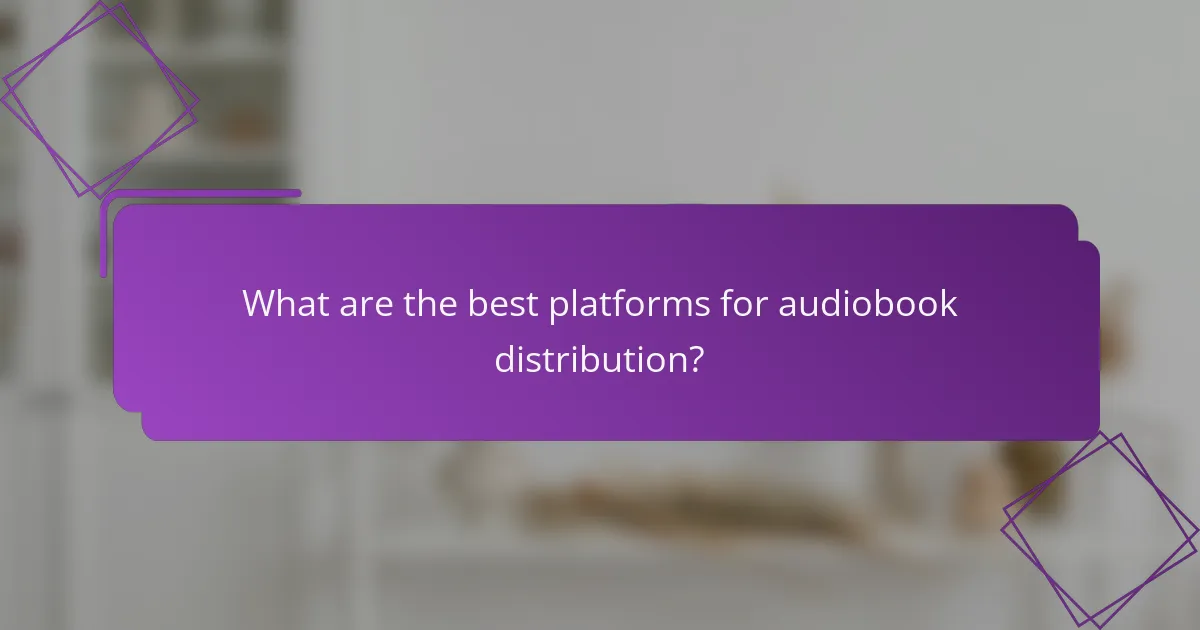
What are the best platforms for audiobook distribution?
The best platforms for audiobook distribution include Audible, Apple Books, and Google Play Books. These platforms offer extensive reach and user-friendly interfaces for both authors and listeners.
Audible
Audible is one of the largest audiobook platforms, providing a subscription service that allows users to access a vast library of titles. Authors can distribute their audiobooks through Audible via ACX (Audiobook Creation Exchange), which connects them with narrators and producers.
When using Audible, consider their royalty structure, which typically offers authors 25% of sales if they choose exclusive distribution. Non-exclusive options yield lower royalties but allow for broader distribution.
Apple Books
Apple Books is another significant player in the audiobook market, allowing authors to sell directly to consumers. The platform is integrated with the Apple ecosystem, making it easy for users to discover and purchase audiobooks on their devices.
Authors should note that Apple Books takes a commission on sales, generally around 30%. However, the platform’s reach to millions of Apple users can justify this cost for many creators.
Google Play Books
Google Play Books offers a straightforward way for authors to publish and sell their audiobooks. The platform allows for flexible pricing and provides authors with the ability to set their own royalties, typically around 70% for books priced above a certain threshold.
One advantage of Google Play Books is its integration with the Google ecosystem, which can enhance discoverability. However, authors should be aware of the competitive landscape, as many titles are available on multiple platforms.
